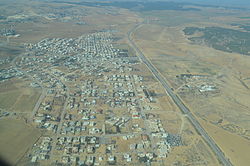Lakiya
Lakiya
|
|
|---|---|
| Hebrew transcription(s) | |
| • Also spelled | Laqye (official) |
 |
|
| Coordinates: 31°19′11″N 34°51′33″E / 31.31972°N 34.85917°ECoordinates: 31°19′11″N 34°51′33″E / 31.31972°N 34.85917°E | |
| District | Southern |
| Founded | 1982 |
| Government | |
| • Type | Local council |
| • Head of Municipality | Khaled el-Sana |
| Area | |
| • Total | 5,728 dunams (5.728 km2 or 2.212 sq mi) |
| Population (2015) | |
| • Total | 11,781 |
Lakiya, or Laqye (Hebrew: לָקִיָּה) is a Bedouin town (local council) in the Southern District of Israel. In 2015 it had a population of 11,781.
Lakiya was founded in 1985 as part of a government project to settle Bedouins in permanent settlements. It is one of the seven original government-planned Bedouin townships in the Negev desert.
In December 2009, the town was ranked lowest (1 out of 10) in socio-economic standing, with an average income of 4,360 shekels compared to the national average's of 7,070. Only 58.2% of grade twelve students are eligible to graduate from high school.
In 1999 the first local council elections were held, with Sheikh Ibrahim Abu Maharab elected as council head. Abu Maharab was later succeeded by Khaled al-Sana.
According to the Israel Central Bureau of Statistics (CBS), the population of Lakiya was 9,943 in December 2010 (7,600 in December 2004). Its annual growth rate is 3.1%. Lakiya's jurisdiction is 5,728 dunams (5.7 km²).
There are several Bedouin clans residing in Lakiya, al-Sana being the largest among them. Other families are: Al-Assad, Abu Ammar and Abu Maharab. Some clans don't live inside Lakiya, but on adjacent territory.
In 2013, Arab-Bedouin women from Lakiya and other Bedouin towns participated in a sewing course for fashion design at the Amal College in Beer Sheva, including lessons on sewing and cutting, personal empowerment and business initiatives.
The Lakiya Negev Weaving Project was founded in 1991, its aim is to empower Negev Bedouin women by applying their traditional weaving skills to the manufacture and sale of woven products. It is based completely on the unique Bedouin heritage passed on from mother to daughter. Approximately 130 Bedouin women are involved in this project in all the stages of the production from initial wool treatment, weaving the rugs, cushion covers and pouches, and selling. These women were provided guidance, professional consulting and hands-on assistance in the fields of marketing, branding, sales, the business's organizational structure and business plan, fundraising and networking. The project's aim was to make it a successful, profitable and financially independent cooperative business. It is about to succeed - several retailers and chains sell Bedouin traditional ground-looms all over Israel, including Haifa, and also abroad. A new visitors' center will be open soon but it has already become a tourist site.
...
Wikipedia

